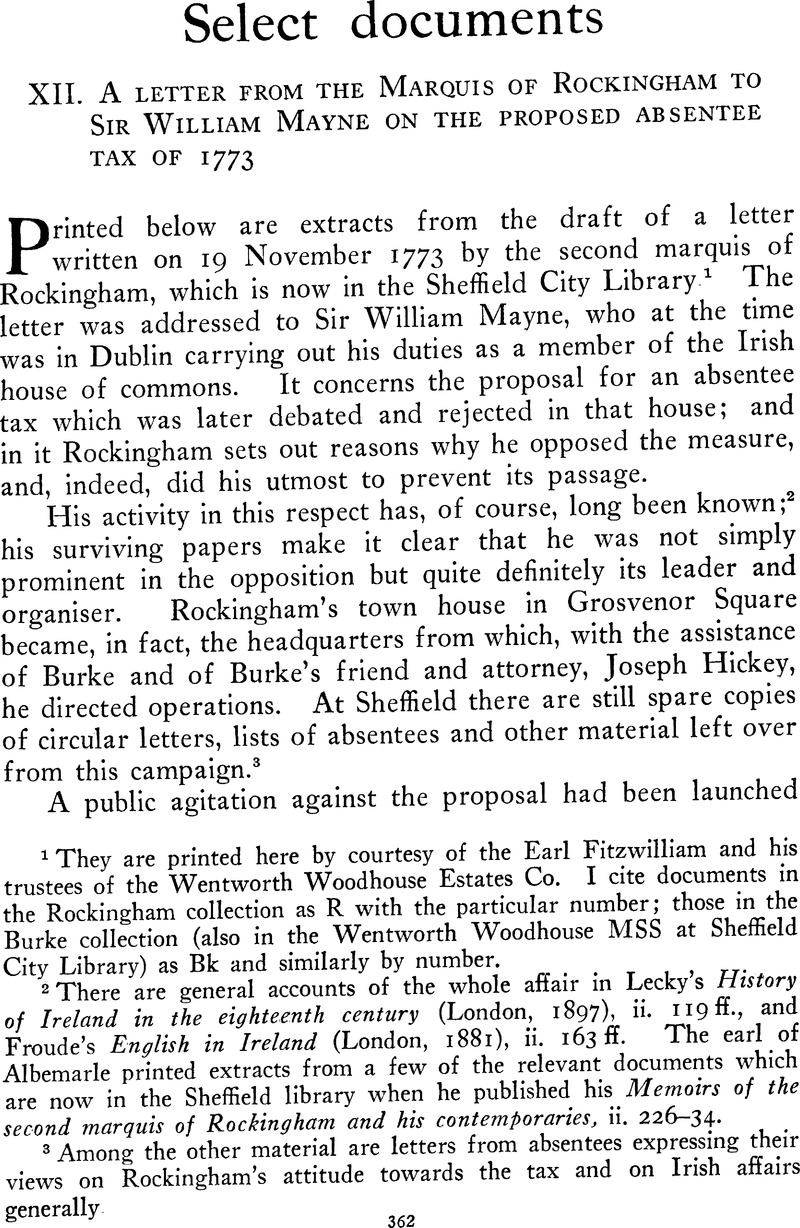No CrossRef data available.
Published online by Cambridge University Press: 28 July 2016

1 They are printed here by courtesy of the Earl Fitzwilliam and his trustees of the Wentworth Woodhouse Estates Co. I cite documents in the Rockingham collection as R with the particular number; those in the Burke collection (also in the Wentworth Woodhouse MSS at Sheffield City Library) as Bk and similarly by number.
2 There are general accounts of the whole affair in Lecky’s History of Ireland in the eighteenth century (London, 1897), ii. 119ff., and Froude’s English in Ireland (London, 1881), ii. 163 ff. The earl of Albemarle printed extracts from a few of the relevant documents which are now in the Sheffield library when he published his Memoirs of the second marquis of Rockingham and his contemporaries, ii. 226–34.
3 Among the other material are letters from absentees expressing their views on Rockingham’s attitude towards the tax and on Irish affairs generally.
4 This protest has been printed several times, e.g. it will be found in Albemarle, ii. 227. The five peers were Devonshire, Rockingham, Bessborough, Milton and Upper Ossory.
5 King George III applied this term to the peers’ letter (Fortescue’s edition of his Correspondence, iii. no. 1311).
6 Horace Walpole (Last journals, i. 259) states that Hertford declined to sign because of his office, that of lord chamberlain. It is obvious, however, from Rockingham’s papers that Hertford supplied him with useful information. Much of this Hertford probably received from Lord Bellamont. Bellamont, for instance, sent Hertford a list of names of those in the Irish parliament who might be influenced by absentees. This list he forwarded to Bessborough who sent it on to Rockingham. Judging by the endorsement in Bessborough’s hand, it is this list which survives in the Rockingham collection as R3–165.
7 Mayne was created Baron Newhaven of Carrick Mayne, co. Dublin, in 1776. I have taken my information about Mayne from G.E.C., Peerage, under ‘ Newhaven ’ and from M. Bodkin’s edition of the ‘ Notes on the Irish parliament in 1773 ’ (R.LA. Proc, xlviii, sect. C, no. 4, pp. 145 ff.).
8 Bk 296.
9 Actually he was replying to two letters from Mayne dated November 7 and 8 respectively (R3-39 and R3-46). In the former Mayne reported that he had shown the circular letter etc. to the duke of Leinster who had told him to assure Rockingham that he ‘ would oppose the tax if brought into parliament in every stage of it with all his power’.
10 Mayne had some contacts with Harcourt himself. On Nov. 28 he wrote to Rockingham about the proposed revival of the plan in a different form reporting that he ‘ had the honour to dine privately yesterday with Lord Harcourt, who declared himself equally surprized with us on hearing it was to be revived’. He did not think Harcourt would give the new proposal any ‘ protection ’ (R3-78).
11 It is written on a number of sheets being R151-1 to 7.
12 In his recent Founding of the second British empire, i. 152.
13 As an instance of Burke’s activities in the City there is an interesting letter to Rockingham on Nov. 7 (R3-148a) in which he refers to Shelburne’s activities. The following extract may be quoted :
I have seen Glynn who has done all that depended on him. My Lord Mayor departed [Bull had just replaced Townsend in this office] has likewise done all that was to be expected from his character & connections. He cooled by a communication w- Berkeley Square as fast as he heated from the vivacity of his natural temper. The wind that blew from the great house in our quarter quite dulled the Mansion House. No common council has been called ; the letters have indeed been communicated to the Irish Society. They have acted properly, & come to a resolution of concurring in an opposition to the proposed tax. Whether it was merely accidental, or the politicks of the court or the (?) of Shelburne house, I know not, but a report was universally propagated & credited that the ministry had quite dropped the scheme. This contributed much to the postponing all ideas of calling a common council.
Rockingham employed Joseph Hickey in listing names of absentees and circularising them. On Nov 7 he also referred to Shelburne when writing to Rockingham on these matters :
Your Lordship will pardon my mentioning that I have very strong reason to believe, tho’ no certain authority that Lord Shelburne has employed Dr Goldsmith to write in favour of it [i.e. the absentee tax]. The Dr is become a great advocate of it & has even condescended to consult me as to my thoughts (R3-40).
This recalls Horace Walpole’s similar anecdote concerning Shelburne and Burke (Last journals, i. 302–3). For Chatham’s attitude on the absentee tax, see, for example, the letter printed by Lecky (ii. 121–2).
14 In the Rockingham collection, R3-137 (a) and (b) are notes, prepared possibly by Joseph Hickey, on Antigua absentee acts.
15 It is unnecessary to repeat here the instances and conclusions of Miss L. Stuart Sutherland in ‘ Edmund Burke and the first Rockingham ministry in E.H.R., Jan. 1932, from which I quote (p. 66).
16 Or, as Burke put it later in a famous speech : ‘ a great empire and little minds go ill together ’